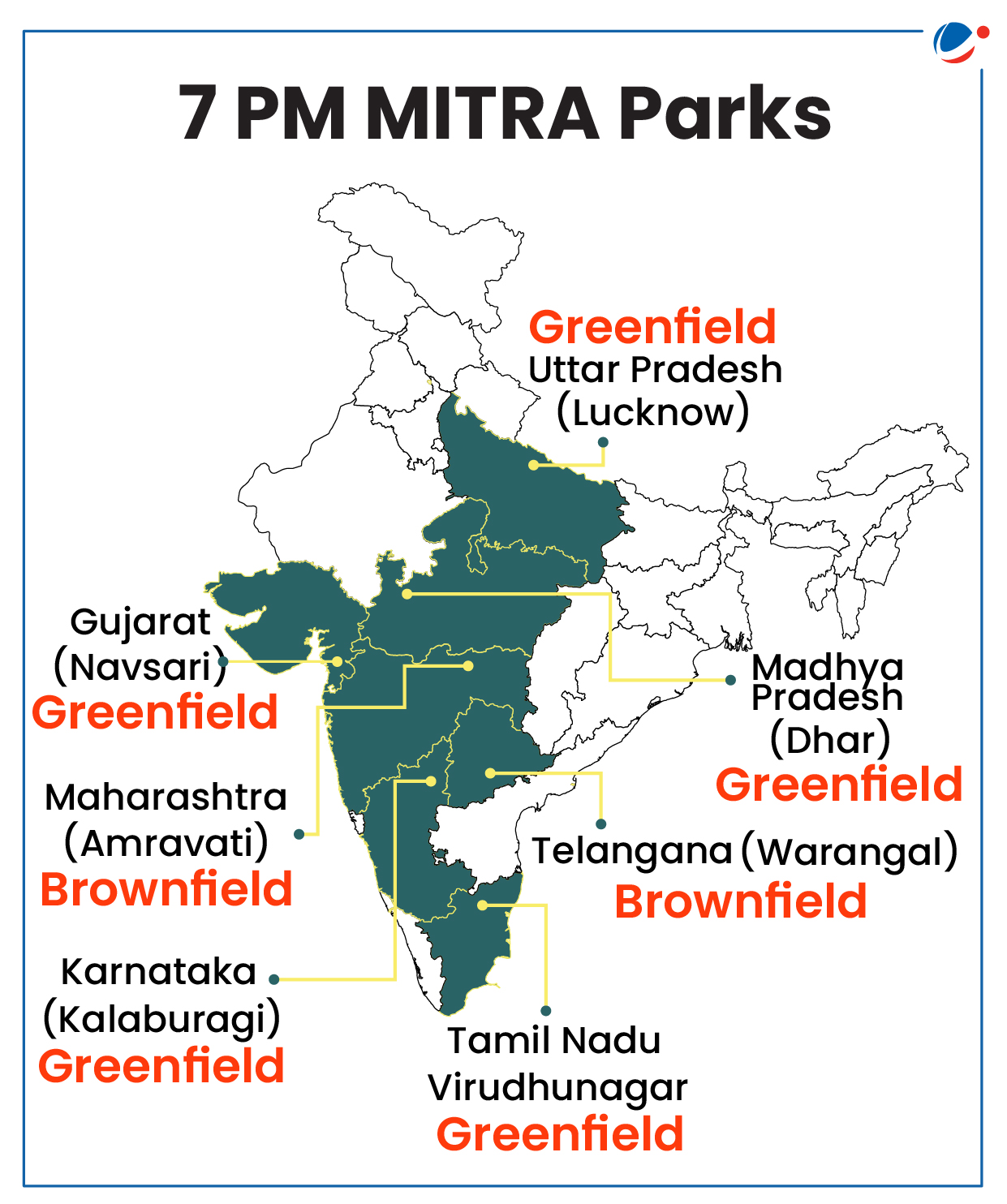Why in the news?
Committee on Estimates presented the report on Empowerment through PM Mega Integrated Textile Region and Apparel (PM MITRA) Parks Scheme and Revival Efforts for the Sick Textile Units/PSUs.
PM MITRA Parks Scheme
- Genesis: It is inspired by 5F vision (Farm to Fiber to Factory to Fashion to Foreign) of Prime Minister to propel India into a leading global hub for textile manufacturing and exports.
- Main Objectives:
- Develop integrated large scale and modern industrial infrastructure facility including plug and play facilities for total value chain of the textile industry.
- Reduce logistics costs by housing entire value chain at one location and improve competitiveness of Indian Textiles.
- Help India in attracting investments, boosting employment generation and position itself strongly in the global textile market through augmentation of export potential.
- Features of MITRA Parks:
- To enable scale, the minimum estimated area per MITRA Park is 1,000 acres.
- MITRA Parks will offer the opportunity to create an Integrated Textiles Value Chain right from spinning, weaving, processing, and printing to garment manufacturing, accessories making at one location.
- MITRA parks can be either Greenfield or Brownfield.
- Governance: A Special Purpose Vehicle (SPV) owned by Centre and State Government jointly will be set up for each park which will oversee the implementation of the project.
- Financial Support: Ministry of Textiles will provide financial assistance up to Rs 800 crores per park for Greenfield projects and up to Rs 500 crores per park for Brownfield projects. Union Government will provide financial support in the form of:
- Development Capital Support (DCS): For greenfield MITRA park, a DCS of 30% of project cost, with a cap of ₹ 500 crore per park will be offered.
- DCS at 30% of project cost of balance infrastructure needs and other support facilities with a cap of ₹ 200 Crore per Brownfield Park will be provided.
- DCS will finance the development of Core Infrastructure comprising Incubation Centre, Plug & Play facility, Developed Factory Sites, Roads, Power, Water and Waste Water system, Common Processing House etc.
- Commercial Development (CD): CD in a limited area up to 10% of the park area on self-financing model will enhance viability of the park and help maintenance of common assets and facilities by SPVs even after scheme’s completion.
- Competitive Incentive Support (CIS): A CIS of up to Rs. 300 crores per park will incentivize early operationalization and quick scale up.
- Development Capital Support (DCS): For greenfield MITRA park, a DCS of 30% of project cost, with a cap of ₹ 500 crore per park will be offered.
Approved 7 PM MITRA Parks
 |
Recommendations to improve PM MITRA Parks Scheme
- Comprehensive policy: Ministry should frame a comprehensive National Textile Policy, with a view to make Indian textile Industry globally competitive by incorporating the best international practices and industry oriented pro-active aspects of State Textile Policies/Schemes.
- Review of selection procedures: Ministry should review the selection procedure with a view to set up more PM MITRA Parks to enable speedy recovery of the Indian Textile Sector.
- Expedite SPV formation: Ministry should find out reasons for delay in formation of SPVs in remaining States and in assisting them for SPV formation at the earliest.
- Out of 7 approved proposals, only two states – Gujarat and Uttar Pradesh – have incorporated SPVs and other states are still in process.
- Tax regime rationalization: State government extends stamp duty exemption, concession on land rates, State Goods and Services Tax (SGST) reimbursement.
- Union government should consider extending similar central tax/duty exemptions including Central Goods and Services Tax (CGST) reimbursements and import duty rationalizations to curb low cost/undervalued import of Chinese knitted fabric.
- Special incentives: There should be provision for special incentives to attract women entrepreneurs.
- The Ministry should make mandatory provision for basic amenities for female workers such as crèche facility, medical care, flexible working hours and assistance for setting up women manufacturing units etc.
- Vertical integration: Take proactive steps to ensure vertical integration of Powerloom Sector beyond the ambit of PM MITRA Parks to convert the Indian textile and apparel industry from fragmented to integrated and from unorganised to organised.



